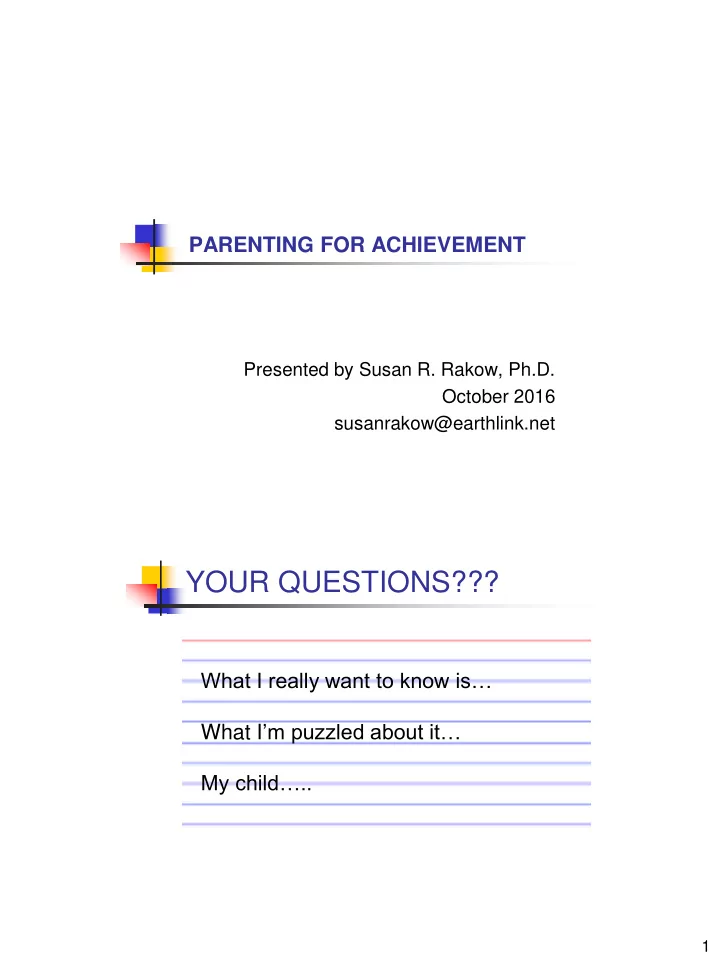

PARENTING FOR ACHIEVEMENT Presented by Susan R. Rakow, Ph.D. October 2016 susanrakow@earthlink.net YOUR QUESTIONS??? What I really want to know is… What I ’m puzzled about it… My child….. 1
KITES Kites fly, (11 yr old boy, CN) But they need an anchor. Kids roam, But they need a home. If a kite loses its anchor, It falls. If a child loses his home, He declines. As a kite goes higher and higher You give it more string. As a child grows older and older You give him more freedom. But here The similarity ends; For kites, Even with the most string imaginable, Crash sooner or later. But kids, (if they are old enough), Adjust safely And create new homes. What is Giftedness? More than a test score! Intensity: spirit, thought, purpose, emotion, soul Greater awareness, greater sensitivity Achievement, Knowledge, Skills, & Abilities Insight Uniqueness Difference from age peers (Delisle 2000) 2
Do You Know Your Child? Greatest strength? Greatest interest? Biggest weakness? Personality type? What do you like best about your child? What expectations do you have for your child? NOW? HS? COLLEGE? WORK? LIFE? Definitions Matter! How do we define achievement? Definition we use impacts how we support and nurture it. How do we define underachievement? Definition we use impacts how we avoid or reverse it. 3
What do we know about Underachievement? Begins around middle grades (4 th through 9 th ) WHY?? More common in boys than girls and starts earlier in boys Some believe nearly 50% of gifted individuals underachieve at some point Motivation ’ s role in underachievement? Selective Achievement: Kids v. Adults Underachievement 2 Possible inappropriate fit of educational/academic options Possible denigration of school and teachers by parents IQ is no guarantee of “ success ” Life accomplishment is more correlated to grades than to IQ Nonproducers – just choose not to do the work because the “ gifted ” label is enough 4
Perfectionism and Underachievement If you don ’ t do it, it can ’ t be imperfect Anxiety interferes with performance – academic and/or creative Excellent v. Perfect Perfectionism limits risk-taking and curiosity “ Specialitis ” Signs of Underachievement Drop in grades Discrepancy between expectation and actuality, between “ what is ” and “ what might be ” Not submitting or completing assignments, projects, homework Disengagement Domain specificity emerges in adolescence and may be confused with underachievement 5
Rimm ’ s Trifocal Model: Student, Home, School Assessment of skills, abilities, reinforcement contingencies, and types of underachievement Communication Change the Expectation of Important Others Role Model Identification Correct Skill Deficiencies ModifyReinforcement: Home & School Executive Function: Parents and Teachers Foundational skills for school and life Decreases stress and anxiety and being “ overwhelmed ” Components (Dawson & Guare) Response Inhibition Emotional Control Sustained Attention Task initiation Flexibility Goal directed Persistence 6
So How Can Parents Help? Stimulate & support children ’ s interests Renegotiate interdependence frequently “ The V of Love ” Danger of too early disengagement Security and Support +Exploration and Independence Danger of overdependence and learned helplessness United Parenting What Works to Reverse Underachievement? Varies by individual School accommodations/responses Counseling Self-confidence and Self-Efficacy Skills Support – for effort AND achievement Meaning Choice 7
Parents ’ Roles Realistic expectations and goals Excellence v. Perfection Family Responsibilities – builds self- worth School connections Self-Esteem, Self-Worth, and Self-Confidence Praise specific actions No “ est ” Praise effort and growth Mindset 8
Rimm ’ s Ten Canons for Achievement – for Parents Responsibility and Independence grow together Referential speaking United parenting – expectations, effort, and messages Opposition occurs when parents ally with child against school or other parent Rimm ’ s Ten Canons for Achievement – for Parents Learn to function in both competition AND collaboration Awareness of relationship between learning/effort and outcomes Avoid overreactions to successes AND failures Confront only when you can control the outcome 9
Rimm ’ s Ten Canons for Achievement – for Parents More tension when kids avoid their work than when they do it – self-confidence and resilience develop through struggle Appropriate role modeling by parents YOU ARE THE ADULT! YOU MAKE THE RULES! Beware of Over-Empowerment! Help Kids Achieve Balance work and social life family and friends challenge of multipotentiality Expectations and consequences Monitor Media and technology 10
Questions and Concerns? 11
Recommend
More recommend